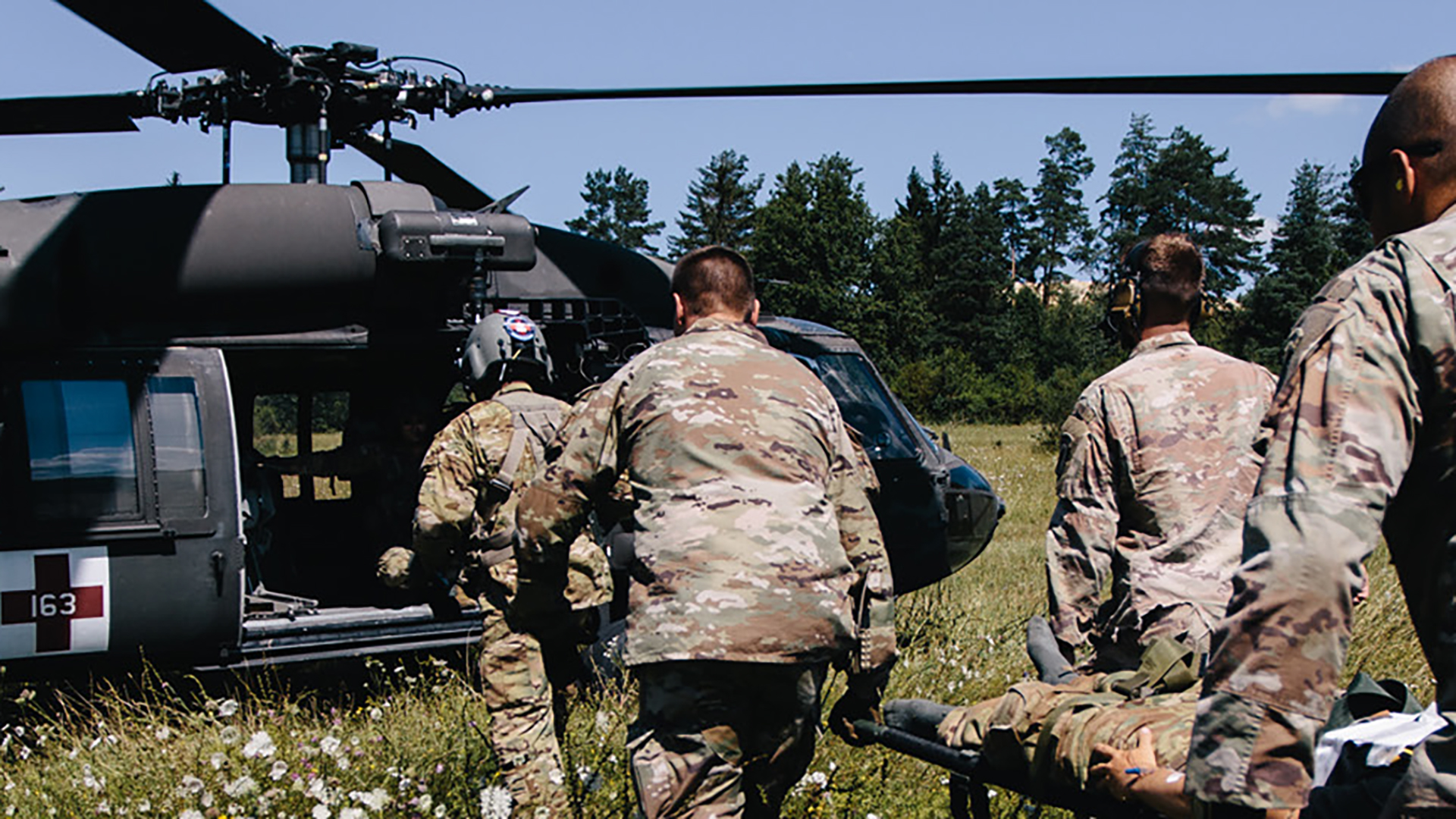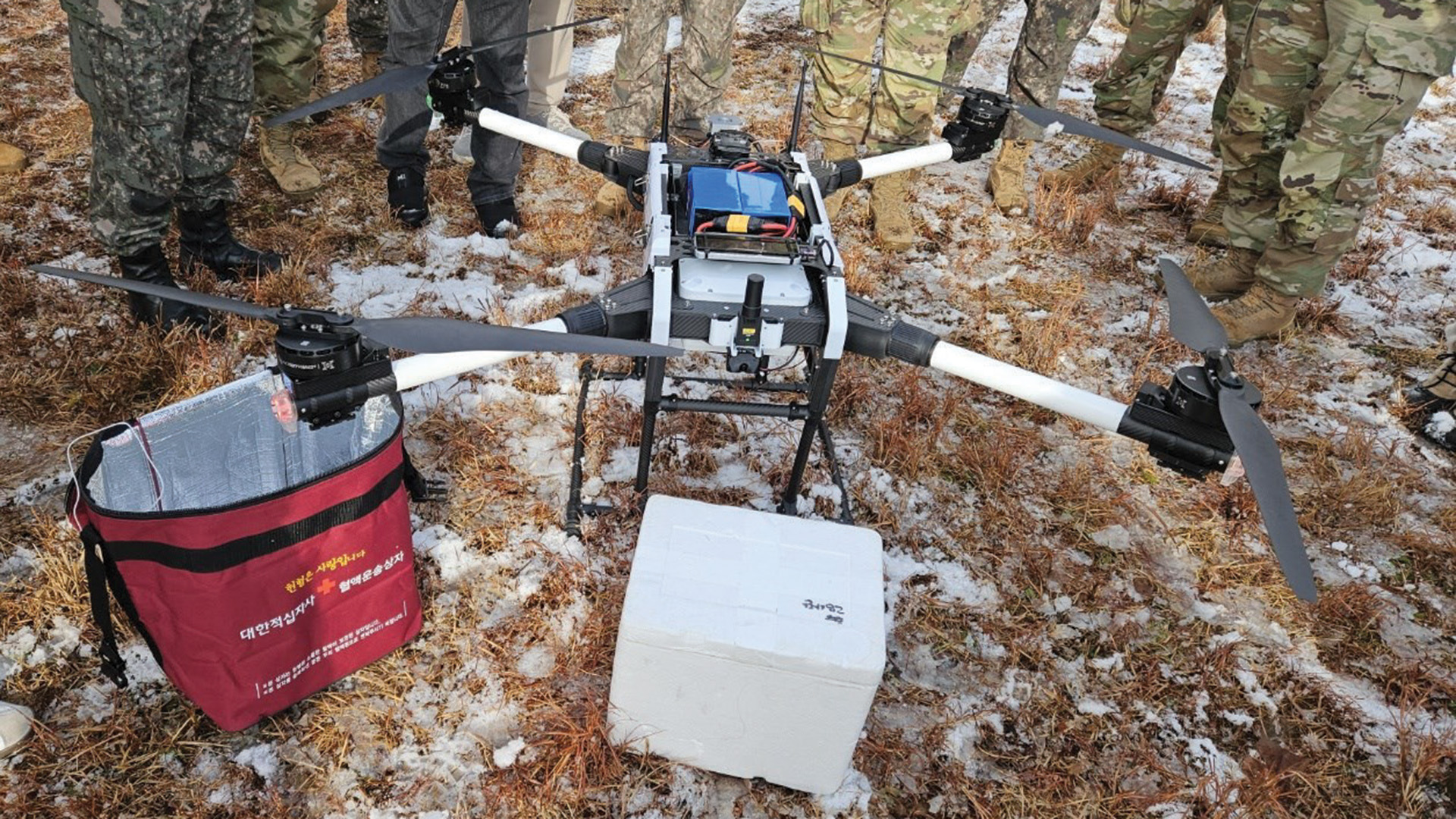Revolutionizing Military Medical Logistics
The Republic of Korea Army’s Groundbreaking Drone Blood Delivery Exercise
By CPT Tae S. Kim
Article published on: May 1st, 2025, in the May 2025 Issue of The Pulse of army Medicine
Read Time: < 5 mins

In the fast-paced realm of modern warfare, timely medical support is vital. Recognizing this, the Republic of Korea Army (ROKA) 28th Infantry Division, alongside U.S. Army medical experts, conducted a trailblazing drone-based blood delivery exercise on November 27, 2024. Stemming from discussions at the 38th Parallel Healthcare Training Symposium, this initiative sought to address logistical barriers in hostile environments. Drones transported blood across 13 miles of rugged terrain in 25 minutes, overcoming simulated interference and adverse weather. This collaboration, involving the Korean Red Cross (KRC) and the 65th Medical Brigade, revealed the immense potential of drone technology for battlefield medical logistics and disaster response. Beyond military use, this advancement offers solutions for remote medical supply challenges. However, adoption requires infrastructure, cybersecurity safeguards, and scalability. This exercise underscores the power of innovation and partnerships in revolutionizing medical logistics, enhancing readiness for future operations, and saving lives in critical scenarios.
Imagine a wounded soldier, bleeding out in a remote location, minutes away from succumbing to their injuries. With every second critical, a drone carrying three units of blood and essential equipment weighing approximately eight pounds emerges as a lifesaving solution. In the chaotic crucible of modern warfare, where every second can mean the difference between life and death, the rapid and reliable delivery of blood to frontline troops is not just a logistical necessity - it’s a moral imperative. Recognizing this urgency, the Republic of Korea Army (ROKA) 28th Infantry Division (ID), in collaboration with U.S. Army medical experts, conducted a groundbreaking drone blood delivery exercise on 27 November 2024. Far more than a technical demonstration, the exercise represented a transformative step in military medical logistics, addressing the dire need for swift, life-saving interventions in contested environments.
The concept for drone-based blood delivery emerged during the 38th Parallel, an Annual Healthcare Training Symposium hosted by the 65th MED BDE on Camp Humphreys. CPT Kim, current commander of the 95th Medical Detachment Blood Support (MDBS), introduced the idea in a presentation on Theater Blood Management as part of the U.S. Department of Defense (DoD) initiatives for future battlefield operations. This concept gained the attention of (ROKA) CPT Yoo, Yongho, Chief of the Medical Department of the Korea Army Training Center, who then presented it to LTC Jiho Kim, CDR of the 28th ID, MED Battalion, and subsequently to MG Chun-Sik Park, CDR of the ROKA, 28th ID, who recognized its innovative potential for addressing critical logistical challenges.
With weeks remaining in his command, MG Park saw this concept and exercise as a fitting final project. While previous drone training in ROKA focused on non-medical applications, MG Park sought to explore the use of drones for medical supply delivery. Recognizing an opportunity for innovative collaboration, the 28th ID team engaged with the Korean Red Cross (KRC), a vital partner to USFK, who in turn collaborated with U.S. Army blood experts. Recognizing the value of this innovative opportunity, COL Arroyo, CDR of the 65th MED BDE, directed a limited contingent to participate in the exercise and report on its outcomes to inform future trainings.
Advancing Drone-Based Blood Delivery
Under the command of the 168th Multifunctional Medical Battalion within the 65th Medical Brigade (MED BDE), the 95th MDBS worked alongside key personnel, including MAJ Mumford (Chief Medical Officer), MAJ Pizarro (65th MED BDE S9), CPL Kim, PFC Yum (translators), and Maj Rhee (Air Force 8th Medical Group). Together, they simulated a wartime scenario in which conventional supply lines were disrupted. Integral to the success of the endeavor was MAJ Victor D. Gaines, former commander (CDR) of the 95th Medical Detachment Blood Support (MDBS). Leveraging knowledge from past exercises and research conducted at U.S. Army Institute of Surgical Research on blood storage and logistics during wartime operations, Gaines played a pivotal role in shaping the operation.

US Army photo from The Pacific Medic, Feb 2025.
The exercise challenged two ROKA 28th ID teams to test the viability of drone-based blood delivery across 13 miles of rugged mountainous terrain. This ambitious simulation involved overcoming obstacles such as simulated enemy interference and harsh weather conditions to demonstrate the potential of drones as critical logistical tools for medical supplies. Equipped with a temperature-monitoring device, the drone completed its mission in just 25 minutes, navigating simulated OPFOR signal interference and unexpected inclement weather. The gentle hum of the drone heralded the landmark achievement. The success of the exercise, marked by the precise and unharmed delivery of its vital cargo, demonstrated the immense potential of drones in overcoming logistical hurdles in Large-Scale Combat Operations (LSCO). Reflecting on the achievement, MAJ Mumford from 65th MED BDE described the exercise as “intrepid.”
When asked about the necessity of the training, CPT Kim explained that during emergencies such as natural disasters or LSCO, the demand for blood surges dramatically. Logistical constraints, compounded by hostile environments and vast distances military units must cover, present significant challenges to the joint force. As CPT Kim emphasized, “We need to look at how we solve these problems before we encounter them”. He further cited the alignment between this concept and the 65th MED BDE Commander’s directive, Preparing for an Army of 2030, as the driving force behind this innovative approach.
Following the exercise, MG Park presented ROKA Certificates of Commendation to MAJ Gaines, Maj Rhee, and CPT Kim for their pivotal roles in the operation. MG Park emphasized the importance of continuing such exercises to build a ready force capable of addressing challenges in a multi-domain operational environment.
Beyond the battlefield: Implications and Challenges
The implications of drone-based medical delivery extend far beyond Korea, with the potential to revolutionize logistical operations across diverse theaters of operation. This technology is especially valuable in regions characterized by challenging terrain or limited infrastructure, providing a reliable solution for swift and effective medical supply delivery. Additionally, this exercise serves as a critical stepping stone towards integrating emerging technologies, such as AI-driven logistics and advanced blood storage solutions, further enhancing battlefield medical capabilities.
The collaboration with the Korean Red Cross (KRC) underscores the dual-use potential of this technology. By integrating military and civilian resources, we are not only enhancing military readiness but also laying the groundwork for improved disaster response systems. In an era of increasing natural disasters, the ability to rapidly deploy medical supplies to affected areas could save countless lives, demonstrating how military advances can have far-reaching global and civilian impacts.
While the exercise showcased the operational promise of drones, widespread adoption requires significant logistical adjustments. These include the establishment of dedicated launch and landing zones, the development of standardized protocols, and the implementation of robust tracking systems. Cybersecurity also presents a critical concern, as drones are vulnerable to GPS spoofing, cyberattacks, and signal interception. Ensuring equipment reliability in harsh conditions and scaling the operations for large deployments are additional hurdles to overcome.
This exercise is more than a technical achievement; it’s a testament to the power of innovation and collaboration in addressing critical challenges in military medical logistics. By embracing emerging technologies and fostering partnerships between military and civilian organizations, we are not only preparing for the future of warfare but also enhancing global emergency response capabilities, ultimately saving lives on and off the battlefield.
Author
CPT Tae Kim currently serves as the Commander of the 95th Medical Detachment at Camp Humphreys, Republic of Korea.